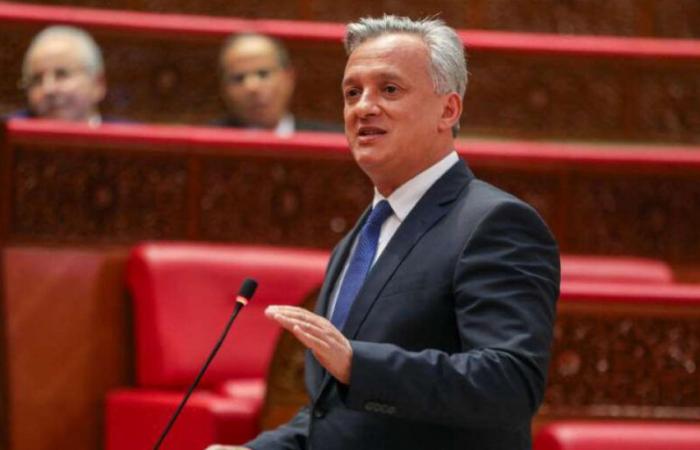The Minister for Investment took part in the oral questions session in the House of Advisors on Tuesday in Parliament. The opportunity for Karim Zidane to take stock of current issues, in particular the New Investment Charter, the reform of the CRI and even foreign direct investment.
Karim Zidane’s grand oral presentation, Tuesday in the second chamber of Parliament, was rich in lessons. Regional distribution of investment, CRI reform, New Investment Charter, foreign direct investment… nothing has been left aside.
The Minister Delegate announced on this occasion that a strategic roadmap has been put in place in order to improve the business climate.
The latter, which should make it possible to define priority projects for the period 2023-2026, is broken down into 46 initiatives aimed at facilitating the act of investing. The aim is to create favorable conditions to attract more investments from foreign nationals or Moroccans around the world.
94 billion dirhams of approved investments
Since the entry into force of the New Investment Charter, the National Investment Commission has approved a total of 171 projects, including 53 financed by foreign investments from 18 countries, for a total amount of approximately 94 billion dirhams. These projects will contribute to the creation of more than 54,000 jobs.
During his speech, Zidane recalled that the government paid particular attention to the mobilization of private investment, through the reform of State investment policy and the adoption of an incentive charter.
On this register, the minister underlined that 83% of these initiatives were launched at the end of 2024, in addition to a roadshow intended to publicize the Moroccan offer in terms of investment and to exchange with leading companies. The objective is to attract strategic projects capable of creating promising economic ecosystems, like the electric mobility sector.
Zidane also affirmed that his department’s action plan to increase investments by Moroccans around the world revolves around strengthening communication with this community, but also the organization of meetings on the occasion of each tour of promotion. This also involves the consolidation of reception, guidance and support structures at national and regional level.
Among other measures, the minister announced the establishment of a specific platform integrating artificial intelligence technologies. The aim is to provide all information relating to investment and translate it into the languages of the countries of residence of Moroccans around the world. Zidane also recalled that a special unit dedicated to monitoring MRE investments has been created within the ministry.
48 projects benefited from the territorial subsidy
Responding to a question on the actions undertaken to stimulate territorial attractiveness and the equitable distribution of investments, the minister affirmed that at the end of the 6th National Investment Commission established by the New Investment Charter, 48 projects benefited from a territorial subsidy. 32% concern prefectures and provinces outside the Tangier-El Jadida axis, thus covering 44 prefectures and provinces.
Zidane recalled that one of the key objectives of the New Investment Charter was to reduce regional disparities thanks to this territorial subsidy. This covers 80% of the Kingdom’s prefectures and provinces, with subsidy rates of up to 15%. The minister also highlighted the possibility of combining basic support systems with regional mechanisms to give an impetus to investments.
He underlined the key role of regional councils in this process, promoting investments being one of their prerogatives. Furthermore, unified and decentralized governance will be established for projects worth less than 250 MDH, in accordance with new regulations. Zidane is committed to developing suitable channels and identifying promising sectors, to enhance and promote the investment potential of all regions.
In this sense, the Moroccan Agency for the Development of Investments and Exports (AMDIE), as well as the Regional Investment Centers (CRI), will be mobilized to support and direct investors to all the prefectures and provinces of the Kingdom.
Reform of the CRI: decree n°1.24.68 of December 20, 2024 comes into force
Regarding the reform of the CRI, the revision of the legal framework carried out in 2019 resulted in the publication in the Official Bulletin of December 30, 2024 of decree no. 1.24.68 of December 20, 2024 implementing law 22.24. This amended Law 47.18 relating to the reform of the CRIs and the creation of unified commissions.
This text insists on the effective decentralization of the investment process for projects of less than 250 MDH, in accordance with the spirit of advanced regionalization, knowing that this category of projects constitutes the majority of investment projects in the country.
The positioning of the CRIs was also rethought with the establishment of a detailed strategic diagnosis including technical and organizational aspects. The objective is to define their new positioning and make them more efficient.
Currently, the national economy is called upon to create more jobs, especially with the rise in the unemployment rate, by bringing private investment to two thirds of total investment by 2035 thanks to the inflection.
To underline in this context the importance of the new Investment Charter aimed at mobilizing 550 billion dirhams of private investment and creating 500,000 jobs between 2022 and 2026. To do this, the government has activated the support mechanisms for investment and supported eligible investment projects to enable them to benefit from the main support system. This involved 162 investment projects with a total value of MAD 244 billion, enabling the creation of 86,000 jobs.
The special support system for strategic investment projects was also activated, benefiting nine investment projects with a total value of MAD 65 billion, with 37,000 jobs at stake. Other measures relate in particular to the development and implementation of the strategic plan aimed at improving the business climate. This includes the launch of 46 initiatives (83% of which have been launched) as well as the activation of governance mechanisms associated with the new charter for investment projects of less than 250 MDH at the regional level.
Yassine Saber / ECO Inspirations






